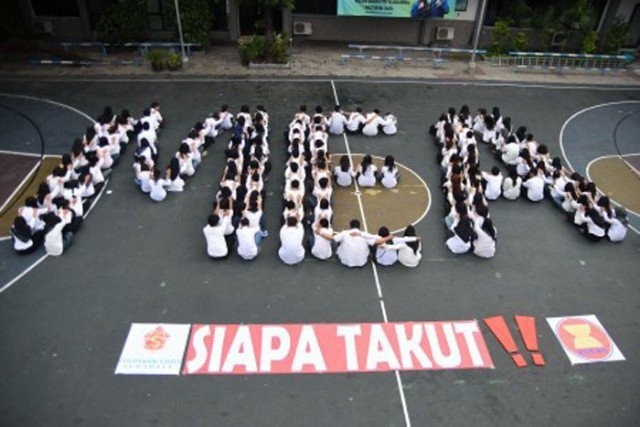Indonesian government, financial authorities turn to youngsters to boost literacy
Change Size
 Prepare yourself: Students form 'MEA', the Indonesian translation of AEC (ASEAN Economic Community), on the courtyard of Polytechnic University of Surabaya, on Dec. 18, 2015. (Antara/File)
Prepare yourself: Students form 'MEA', the Indonesian translation of AEC (ASEAN Economic Community), on the courtyard of Polytechnic University of Surabaya, on Dec. 18, 2015. (Antara/File)
G
iven Indonesia’s young population, the government and financial authorities are turning to students and youngsters to boost the country’s painfully low financial literacy rate. It is estimated that less than a third of the country’s population own bank accounts.
Paulus Rumangkito, a ninth grader, told President Joko “Jokowi” Widodo that he had made it a habit to set aside a small amount of his pocket money to be deposited into his savings account.
“I save Rp 1,000 (7.7 US cent) to Rp 5,000 from my pocket money every week. It’s already a year now,” he told the President during the launch of National Savings Day at the Jakarta Convention Center on Monday.
Paulus, who goes to the YPK Paulus Dok Lima junior high school in Jayapura, Papua, first learned about saving money from his civil servant parents.
His school also obliges its students to open a bank account, dubbed Simpel, a facility provided in partnership with state lender Bank Tabungan Negara (BTN). He plans to use the money he saves to fund his future education.
Meanwhile, eighth graders Edel Weis of YP IPPI in Petojo, Central Jakarta, and Fakhry Arvito Darmawan of SMPN 2 in South Tangerang, Banten, said their parents were the first people who had taught them about saving.
“I prefer to save my money because I don’t really like hanging out,” Fakhry told The Jakarta Post on the sidelines of the event.
Paulus, Edel Weis and Fakhry are just three among millions of students that the Jokowi administration will rely on to improve the nation’s financial literacy.
Jokowi said the youth potential of the country was large, considering that millions of other citizens did not have savings accounts.
Data from the International Monetary Fund (IMF) shows that Indonesia’s gross national savings per GDP stood at 30.87 percent as of 2014, lower than the 46.73 percent reported by neighbor Singapore.
“We still have 44 million students. This can be further developed,” the President said in his remarks during the launch.
The Financial Services Authority (OJK) — which oversees the banking industry — also sees the savings-toGDP ratio as too low to finance various development goals.
The OJK has launched several savings programs, including Simpel, or Simpanan Pelajar. It is a basic savings account with easy and simple requirements designed for students and issued by lenders to promote the habit of saving and financial inclusion at an early age.
During the Monday event, Jokowi also urged banks to address complaints regarding high administration fees that burdened the public.
OJK chairman Muliaman D. Hadad said the authority and the lenders had fulfilled the President’s instruction to lower savings account administration fees, especially for Simpel and other basic savings accounts.
BTN president director Maryono said his bank would look at the possibility of lowering the fees of savings accounts for those in the middle and low-income bracket.
Meanwhile, National Banks Association (Perbanas) chairman Kartika “Tiko” Wirjoatmodjo, who is also president director of Bank Mandiri, said that while he agreed with the instruction, banks should also look to their investments and costs in providing such services.









